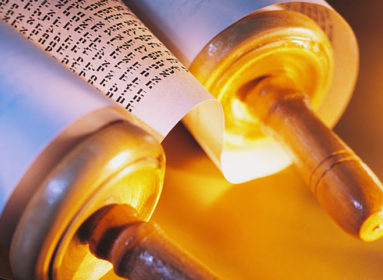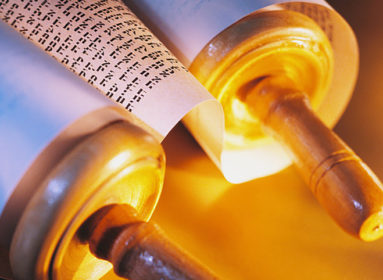
“And they shall make for Me a Sanctuary, so that I may dwell in their midst” (Exodus 25:7)
The portion of Teruma opens with God commanding the construction of what amounts to the first Temple (structure dedicated to the service of the divine) in Jewish history. Even in the desert, the Israelites apparently had the required materials: gold, silver, copper, acacia wood, precious stones, ram skins (Exodus 25:3-6).
So why was the tabernacle a tent with walls made from skins, rather than a portable building? Such a building could have been constructed in segments like “Lego,” but would have looked more like a permanent structure.
The answer is found later in the Bible. After King David returns from his battles, he summons the prophet Nathan with a proposal to build the Temple: “See now, I am dwelling in a house of cedar-wood while the Ark dwells in the midst of hanging curtains!” (II Samuel 7:2)
Initially, the prophet tells the king to use whatever materials he wishes to house the Ark, but that night God appears to Nathan in a dream; “Go and say to My servant, to David…. Shall you then build for Me a house? I haven’t dwelled in a house from the day I brought the Israelites from Egypt until this day. Instead, I have moved about [like a wanderer] in a tent. Wherever I moved among the children of Israel, did I ever say one word to any of the tribes asking “Why did you not build for Me a house of cedar?’
“And now so shall you say to My servant, David: thus says the Lord God of Hosts: … I shall be with you wherever you may go… I shall make a place for My nation Israel… and wicked people will not continue any more to afflict them, as they did before… And the Lord is telling you that He shall make for you a house… only the one who shall come forth from your loins and with whom I shall establish a permanent kingdom, only he shall build a house to My name, and I shall establish the throne of his kingship forever” (II Samuel 7:1-17).
God is telling David that He is not interested in a fancier dwelling dedicated to His Name unless it will be a house to also bring “the gentile from faraway lands… in order that all the nations of the earth shall know Your Name to revere you like Your nation Israel” (I Kings 8:41-43, 54-60). Until the final Redemption, God’s presence cannot fully dwell in a building. He will, however, provide a house for a good sovereign like King David and He will shepherd his nation and provide the Israelites with shelter despite persecutions and pogroms. In other words, God’s presence will not fully dwell in a luxurious Temple as long as Israel and the world are not yet redeemed.
I believe that God, through Nathan, was hinting at one more important message. When explaining to King David why God had never requested a cedar house, he adds that “wicked people will no longer continue to afflict them as they did before” (II Samuel 7:10). Clearly, this refers to oppressors like Pharaoh, who forced the Israelites to build stone houses. But, perhaps in a lesser way, it is referring to King Solomon, David’s son and successor. For when King Solomon builds the Temple to God, he taxes the Israelites heavily, and even uses forced labor for the construction: “And King Solomon levied a tax from all of Israel; additionally he sent 30,000 men to work in Lebanon for one out of every three months, 70,000 carriers of burden [reminiscent of Egyptian enslavement, Exodus 2:11], 80,000 who dug deeply into the mountain and 3,300 taskmasters who were the overseers of the men doing the work.” (I Kings 5:27-30). Moreover, the biblical text maintains that King Solomon built cities of storage houses reminiscent of Exodus 1:11.
Due to the building of an exquisite Temple to the Lord, Israel is pictured as a junior Egypt; prosperous, but resorting to slave labor to produce its magnificent edifices.
No wonder God does not want such a House! And the folly goes from bad to worse when the next monarch in line from the Davidic dynasty, King Solomon’s son Rehoboam, refuses to reduce the burdens, even adding to them. This sparks the rebellion of the Ten Tribes, divides the Kingdom of Israel, and ultimately leads to the destruction of the Temple.
Moses was indeed the wisest of men; he built a Sanctuary to God in the form of a modest tent, without compromising the freedom of human beings created in God’s image.
He didn’t even levy a tax, but merely called on “every person with a generous heart to take up his offering” (Exodus 25:2).
Shlomo Riskin is chancellor of Ohr Torah Stone and chief rabbi of Efrat, Israel.







 Southern New England Jewish Ledger
Southern New England Jewish Ledger














